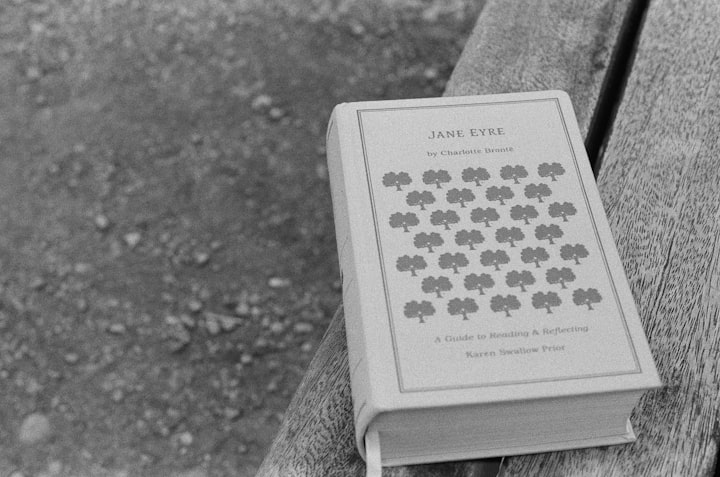15 Classic Books Like Jane Eyre — Read This Twice
What are some classic romance books like Jane Eyre? If You Like Jane Eyre by Charlotte Brontë, Read These Books

Reading not only allows us to broaden our horizons and increase our knowledge; it also allows us to improve our writing ability; it also allows us to learn various excellent qualities from the protagonists of the book.
And as women, we should read books, because books will tell us how to be an attractive woman.
The so-called charm is not just about appearance, but more about inner quality.
Forgiving women make people feel warm, humorous women make people feel happy, confident women make people feel strong, elegant women make people feel comfortable, and temperamental women make people feel generous.
Some books are on your bookshelf, but you don't even have the desire to open them, while some books are read over and over again by you, but you can't help picking them up again and again and again intoxicated by their charm.
This is the difference between ordinary books and good books. The former is optional, while the latter is highly sought after, enduring, and often new.
Just like the world-famous book "Jane Eyre", this book has been on the bestseller list since its inception. No matter how the books around us are updated, it is the most loyal choice for readers. It proves with data and sales that good books are never buried.
Not only that but "Jane Eyre" is also included in the textbook, bringing inspiration to every child's childhood, such recognition is enough to explain everything.
If you don't know what to read, you can't go wrong with Jane Eyre first.
Many girls have owned a copy of "Jane Eyre" since childhood, and they will open this book from time to time until they are young, middle-aged, and even old because it is so classic that it can make people get different experiences at every age. Inspire.
Watching "Jane Eyre" when they are young, most people will be shocked by Jane Eyre's character and moved by her love. But when you look at it as an adult, you will not only stop there but see the way you should live from Jane Eyre.
I recommend the following 15 Classic Books Like Jane Eyre that are most suitable for women to read. After reading them, I believe you can also become an attractive woman.
15 Classic Romance Books to Read if you love Jane Eyre
Table Of Contents
1. Villette
2. The Tenant of Wildfell Hall
3. Agnes Grey
4. Wuthering Heights
5. Northanger Abbey
6. Rebecca
7. Mrs. Dalloway
8. A Little Princess
9. Little Women
10. Anne of Green Gables
11. Wide Sargasso Sea
12. The Turn of the Screw
13. White is for Witching
14. The Thirteenth Tale
15. Glass Town
1. Villette
Book Summary: Villette by Charlotte Brontë
As Charlotte's most autobiographical novel, she always carefully protects Lucy Snowe's true thoughts, like a shy girl who is unwilling to admit that she has a crush on others in adolescence, and deliberately locks her diary so as not to be seen through by everyone at a glance.
Charlotte of the 1850s was not the hopeful little girl she was when she wrote Jane Eyre. She is lonely, she is old, but she is still pious, stubborn, and continues to mediate between reason and emotion.
Lucy Snowe is just a younger version. Her emotions are ahead of her courage. She loves, but she doesn't dare to love. She can't admit it to herself, let alone to the readers. The editors and others even suggested that Lucy is an unreliable narrator. Yes, she is.
Under such circumstances, the first few chapters made me very depressed, and at the end of the first volume, I finally felt that I could continue reading. Because she finally admitted her loneliness, and she longed to get along with people and company.
At the beginning of the second chapter, it is estimated that many readers will slap the table like me, fully exploring the infinite possibilities of dog blood under the seemingly plain plot. . .
But this kind of bullshit is not reproduced in this chapter, it just describes how to correct the wrong love view of the crush, how it was ignored by him, and finally, he was asked to make a confession on behalf of him. . . The bitter girl route, this is not. . . But the girls who are used to secret crushes are afraid to feel the same way. Even if Lucy doesn't say it, she feels sad to death...
Later, when I met a rational representative, it was considered that someone liked me anyway. In addition, that person was academically good, reliable, and had a good temper.
In short, everything became more pleasing to the eye. All kinds of lies and dismantling of rivals, as well as the unimaginable three years of not seeing each other, and they are about to be together~! So here comes another dog blood plot. . .
Linguistically, the general style of that era, coupled with the author's love for Pilgrim's Progress and the Bible (similar to Jane Eyre), often leads to various metaphors and references, but Penguin or Oxford's edition notes are more detailed.
What makes people mad is the French interspersed in the middle. At every critical moment, everyone will start adding French when they are emotional (because Brussels/Villette is a French area), even if there are comments, it is not good to read!
You think, if you see two people arguing in Mandarin, quarreling, and starting to speak Hokkien dialect (I am a Hokkien idiot), then you can't grasp the keywords, wouldn't it be very tight in your chest!
Charlotte likes to use juxtaposed adjectives in language. There are many long sentences, which are a headache, but she can also use short sentences at key moments just right. For example, The night is over. All is over.
Another thing that makes people unbearable about this aunt is that she often gets up high and writes her own associations, deliberately maintaining a certain sense of fragmentation and ambiguity of the picture, writing several pages, watching After a long time, she found out that she was just guessing. . I was wondering if she was Woolf's predecessor...
Like all women in love, her descriptions of characters become very fast, and she deliberately doesn't let you see what she thinks, so she uses a detached tone when describing key characters, just like Lucy's performance. out of the detachment. Lucy's explanation for this is: As for this part, I would like to keep a little to myself.
2. The Tenant of Wildfell Hall
Book Summary: The Tenant of Wildfell Hall by Anne Bronte
A story of a girl who is quite self-assured and confident, but is still very simple in fact.
Helen's self-confidence when she first entered the social world, half-joking with her aunt, very Austen's style, impressive, a little rebellious girl in adolescence began her life in this way. In the story, there are people who the girl likes and people who don't like. The knight rescues her from trouble.
With funny and humorous chats and laughs, the girl falls. Her feelings are so strong, and the portrait is her secret voice. If there are no Arthur's little tricks, would she have combined with it so quickly? Although anxious and apprehensive. But is it really love? Is love covering the eyes?
The girl is savoring her new life, and the sweetness always comes first, and whether it will last is another story. Life is always realistic, but is it cruel? The other half of the iceberg already exists!
Helen walked step by step, worried, worried, disgusted, rejected, broken! remorse? If I did it all over again, would there be a different choice? Arthur is dead, she's free, and she's happy, as the book ends. But why don't I think so?
Just as the comments said Helen was too much like a missionary, in the later period she (in her diary) was stubborn, righteous, and dignified religious creeds were tiresome, and she had lost the vivid color of the past. The flowers withered.
What was Hargrave like? gentleman? Although he had been helping Helen, it was always selfish. Does he want to play the love game? Some are not, but why is there always a shadow of evil in him?
If Helen's moral sense is weaker, or her character is less determined, then there will be another story, the bewildering Hargrave, who is only the touchstone of Helen's moral and religious beliefs?
Millicent is such an interesting person, she would marry Arthur's friend Hattersley! It's really surprising, thinking that at the beginning, she was the one who advised Helen to be careful and recognize Arthur!
I thought she would give Hattersley a solid lesson without hesitation! But the result was a confused and flustered marriage. Hattersley's return was her thankful, sudden luck, and perhaps the author's contrasting luck for Arthur's finale. really not easy!
After reading it carefully, only Helen's diary is the most attractive, and the stories in the diary are the most exciting!
3. Agnes Grey
Book Summary: Agnes Grey by Anne Brontë
Before I read it, I thought she was a weak woman who suffered from asthma for a long time, with an introverted and contemplative character. Her words were sad and sad, and even though they made people feel sad, she was between the expression of self-emotion or heavy reflection and preaching. Even if the work is attractive, it does not make me feel any admiration for the author.
The book is not thick, and the beginning is not a long and charming description of the scene. She does not seem to be in a hurry to catch the reader's nerves, but the short monologue is so pleasant to read, and the plot unfolds in the introduction of the parents' story.
She communicates with readers in calm language and shows herself sincerely, which makes me feel as if a good friend is telling me something intimate, which makes me involuntarily care and give my sincere blessings.
The part about her self-dissection that captivated me the most and showed her wit and charisma the most. She has an incomparable reverence for perfection, perfection, and perfection as the highest value standard, and thus has gained incomparable strength and enthusiasm.
Her firm belief and self-respecting personality made her think deeply and powerfully about human nature and emotion. She moves toward deeper and broader thinking in her thinking, and she does not move toward blindness, arrogance, or paranoia in her inquiry, and perhaps with God's guidance, she does not feel lonely, weak, or powerless.
She unswervingly believes in what she believes, and strongly inspires readers to yearn together. I also firmly believe that it is worthwhile.
I really regret that the god she believes in has not given her more human experience. Maybe she can go to heaven to meet William Wittman, but selfishly speaking, how much I hope this lady who I admire can have more time, more experiences, more work, and more protagonists who can become good mentors and friends can give me more support and inspiration.
Salute to you, Anne Bronte.
4. Wuthering Heights
Book Summary: Wuthering Heights by Emily Brontë
When referring to Emily Bronte's "Wuthering Heights", Woolf said that the impulse that prompted Emily Bronte to create was not her own pain and injury. After reading "Wuthering Heights", I can't believe it.
She said so. The kind of heart-wrenching passion in the novel is almost impossible to achieve by one's imagination without personal experience.
A well-meaning gentleman leads back from the street a dark child who grows up in love with the daughter of this gentleman, while his son abuses him in every possible way. Because he felt the low status of the outsider, the person he loved married someone else, and wanted to give him a chance to change his fate, but this hurt the outsider's self-esteem even more.
He mysteriously disappeared before his lover married someone else, and a few years later, he made a fortune and launched frantic revenge, he not only got the property of those who had hurt him, but also watched them die one by one, And continued his revenge on their next-generation, fate finally mocked him, his son was a helpless douchebag, crying all day, sick, dying early, and his enemy's The child is just a replica of his youth.
The person he loves and the daughter born by others become her daughter-in-law and later become a dead wife. He cannot prevent a new love from happening and finally dies in desolation. That's the story Emily Bronte tells us in her "Wuthering Heights."
When comparing "Jane Eyre" and "Wuthering Heights", Woolf said that "Jane Eyre" wanted to say "I love, I hate, I suffer", while "Wuthering Heights" went beyond itself and wanted to say " we, the whole of humanity" and "you, the external forces".
I can't see any difference in the expression of love between the two books. If there is any difference, then "Wuthering Heights" expresses "I love more, I hate more, I suffer more", this kind of love, hate, the pain has reached its limit and brings nothing but madness and destruction. For two people who are madly in love, "we, the entire human race," "you, the outer world" is nothing, they are each other's entire universe.
"If everything else is dead and he's alive, I can live; if everything else is and he's dead, the whole universe will be so strange that I don't feel like I'm part of it anymore." As long as it is said in the mouths of people who are madly in love, I can hardly believe that love will last forever, but I believe that these words are from the bottom of my heart, and they are sent out with blood.
Love, when it was still sweet, was sunshine, rain, and syrup. When it is no longer sweet, it is a cold sword, the deeper the love, the more blood drips. For those who have suffered from love, it will be a sobering agent at any time, making him cautious before falling in love again,
but even this will not necessarily prevent love from happening again until it shatters all that person's love about love's dream. I don't know how many people die for love, but I believe most of them survived and they survived until the years healed all their memories. How scary it is to think that one day we will be lost in the memory of someone we once loved.
"I wish I could hold on to you," she continued bitterly, "until we both die! I shouldn't care what you suffer. I don't care about your pain. Why shouldn't you suffer? What? I'm suffering! Will you forget me? Will you be happy when I'm buried in the dirt?
Twenty years from now will you say, 'That's Katherine Earnshaw's grave. A long time ago I loved her and was sad to lose her, but it's all over. I've loved many more people since then: my child is more dear to me than she is; and, when I die, I won't I'm glad I'm going to her: I'm going to be sad because I have to leave them!' Would you say that, Heathcliff?"
But as long as you live, you have to deal with all kinds of things, until those complicated memories slowly drown out the initial memories, until old age, until life is flat until there is no desire for this world. It was a luxury to live on memories and revenge like Heathcliff did.
Emily Bronte lived to be only thirty years old. I don't know her background, but I think she was burned by passion and despair, which may be a happy thing for her.
5. Northanger Abbey
Book Summary: Northanger Abbey by Jane Austen
As Jane Austen's first work, despite a lot of revisions, you can still see the tenderness of the writing and the youthful simplicity and humor. There are no sophisticated analysis options, only youthful fantasies, and unreserved efforts. This is not only the author himself but also The author describes an ordinary, lovely, kind, and warm heroine.
Reading Austen is lighthearted, she created our minds and knows ourselves better than we do. And what I was thinking was exactly what was written in the book. "There are very few women in the world, you won't have any other feelings when you know them, you will only be surprised that there are men in this world who like them and marry them if they like them."
"Talking about politics leads to silence. "It turns out that no matter when and where young women first enter the society, their thinking will intersect. Even having unconventional fantasies about the people and places around them is undoubtedly the patent of young women.
From the beginning to the end of the book, the author's youthful playfulness is always revealed inadvertently. Unlike ordinary young people who have fallen into the situation of "forcing new words to say sorrow".
This may be one of the reasons for Austen's eternal charm among female readers. The story of serenity, leisure, freshness, playfulness, and happiness is not our weekend afternoon dream!
6. Rebecca
Book Summary: Rebecca by Daphne Du Maurier
Without further ado, let's talk about Rebecca. In this novel, she has never appeared, but she has always existed in everyone's heart. Outsiders thought this stunner was impeccable: beautiful, noble, intelligent, capable, daring, and powerful;
but in her husband Derwent's eyes a complete devil, bitch! She can pretend that everyone can't see her heart, can't see her wildness, and can mix with anyone and confuse all beings. She would do unethical things, and she's in the process of cleaning up.
This woman is too independent, too bold, she can ride a horse better than a man, and naturally, she can go out to sea alone. She loves no one, she only loves herself. She didn't want to be someone's accessory, and she didn't want to have a man's surname after her name.
How scary to think, why ask your opinion on what to wear? Why do you talk about your color? Why do you have to invite guests and friends to hold a party as you wish? Just because of your surname!
I think this is a women's liberation novel, and the two heroines in the book are from two eras. Rebecca, she seems to be a feminist, she pursues her own freedom, enjoys all kinds of men, enjoys pleasure, maybe she is called a bitch, so what? She has a hut of her own. Anyone can spend the night here without being granted residency. As soon as the sun rises, people will leave.
I think Rebecca may not bring too many people of the opposite sex here. Anyone who is willing to go to sea has a heart that cannot be tied. She may just hope that she can continue like this, reading a book, being in a daze, and sleeping. Yes, only where will she feel that she is the master, she is Rebecca, not the mistress of Mandali, not Mrs. Derwent.
And the poor other Mrs. Derwent, Mrs. Continued Strings, was so well-behaved. It is no wonder that he is loved by the male protagonist. Men all want to have a wife like Rebecca, and at the same time are afraid of having it. Just because it's hard to tame? No, it is not.
They are afraid that women get more respect and praise than them, and they are timid that their own light will be covered up by her. Let the man, the great sun, hide under the moon's brilliance. They can't stand the trick of controlling women being used on themselves.
From beginning to end, the male protagonist never loved Rebecca but was satisfied with the emotion that Rebecca brought prosperity to the manor and brought honor. Men are only afraid of the face. And this Lady Continued String is far less beautiful than Rebecca, and she is dull, but what men see in her is her innocence and her duty of being at the mercy of others.
Mandoli's masquerade was not because Mrs. Sequel dressed up as Rebecca in the past to make him angry, but she went against his will for the first time after marriage - not dressed as, Alice, that innocent child.
A man is naive. He wants to marry a wife and hope that she will always keep the feeling she had when she knew her. Little do they know that a woman can become more perfect herself. This may also be a form of control and escape.
"Your funny and confused expression like a little girl, the expression I like, has disappeared without a trace. Never again...you've become mature and prudent all of a sudden..."
How could Derwent know how many times this little girl was sad because she couldn't hold herself back because of her immaturity, and was afraid that she would not be able to do Mrs. Derwent? In reality, how many men leave because women have been naive and unable to mature?
Men want women like this, women like that, man, what do you want?
Although Rebecca ended tragically, she truly lived out herself.
Woolf once wrote a book called A Room of One's Own, which encouraged women to be independent and have opinions about their own cabin. I think the best quote from the book here is "A woman must have money and a room of her own if she is to write fiction."
About the Creator
Muhiuddin Alam
I'm Muhiuddin Alam, a blogger and content writer. Explore book recommendations and reviews of fiction, novels, and nonfiction on your trusted site ReadingAndThinking.com. & Geek Book Reviews.com






Comments
There are no comments for this story
Be the first to respond and start the conversation.